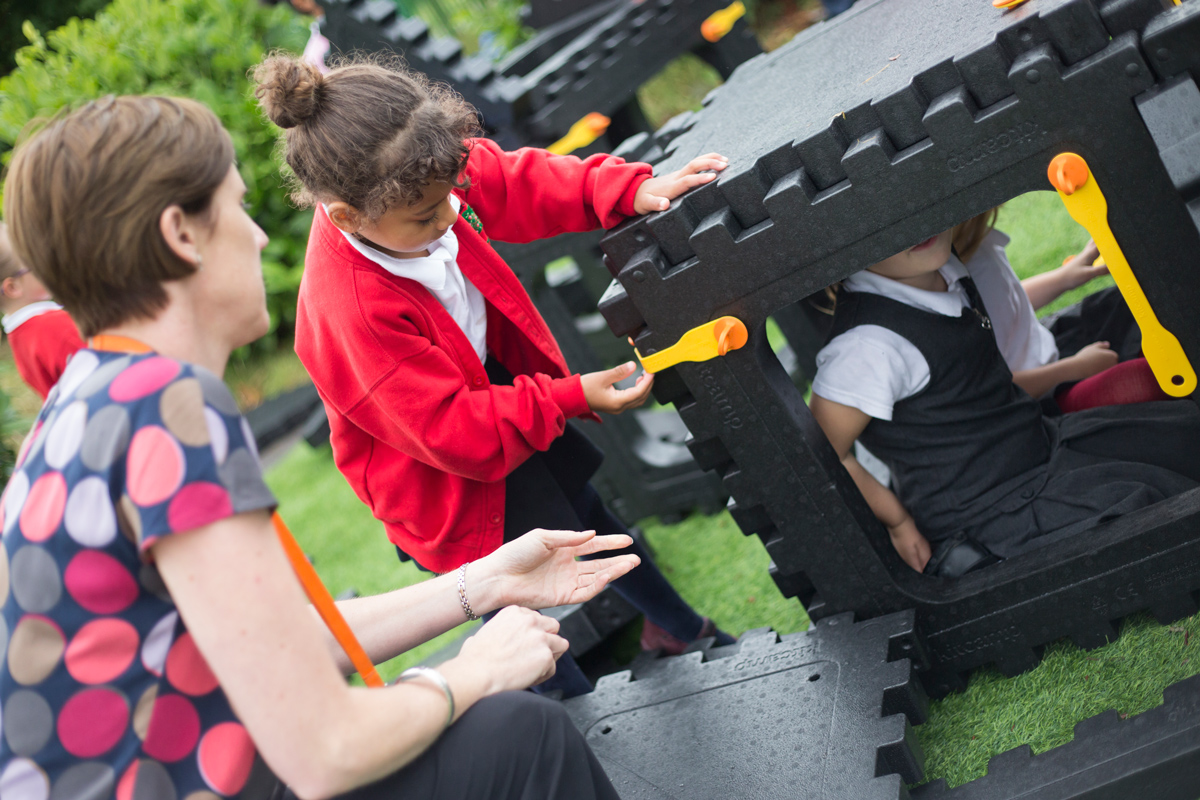The power of adult language

Language has the power to create a genuine sense of inclusion[1] along with a growth mindset for children. How can we ensure we are using it to full effect? How does play provide a platform from which to develop mindset and inclusion? Here, I explore the possibility that we can inadvertently cap learning or create stereotypes, can use play to develop a mindset and conclude with a reflection on the ‘talent myth’. By changing our mindset, perhaps we can make a difference to that of the children we work with.
Language
Practitioners are taught about the importance of positive language early on; to address the behaviour, not the child, to use positive reinforcement etc. It is interesting to look at how this links with inclusion.
Children need to ‘see’ themselves in the environment. Equal representation of all cultures, family groups, ethnicities, physical disabilities and gender fosters a sense of belonging. Images around the setting – books, posters and resources have an important part to play. However, all this good work (and spending) is easily undone with an innocent and flippant adult comment.
Gender
How many times have you overheard (or said) “I need a big strong boy to help me move this.” What underlying message is this giving? There are many clichés: I recently overheard a parent-daughter exchange about “those stinky boys”. Think about this for a moment. What is she implying? That boys are less clean, making girls superior (I imagine this was her point)? Could one interpret that boys have more fun getting muddy and dirty, thereby implying that girls don’t? Can’t girls be stinky too?
Avoiding and creating gender stereotypes is more challenging than we realise until we stop to reflect – perhaps because certain phrases are so embedded. People may joke “you big girl’s blouse”, or “crying like a girl”. Remarks that simply suggest boys shouldn’t be sensitive. Not a great message, and when did blouses deserve this put-down?
Family Representation
Our socio-dynamics have changed considerably over time, making it important to ensure all are represented. When we consider family groupings an effective language change is to not say Mum and Dad or even parents, but simply to refer to ‘your grown-ups’. Small change. Powerful difference.
Ability
Language can cap or extend learning; even in play. “Let’s choose xxx he’s always really good at xxx…” implies that the skill comes naturally and therefore out of reach to others, or more damaging, “Leave that, last time it all came crashing down. Let’s ask xxx to help.” Immediately a feeling of ‘not good enough’ washes over the first child.
Common (good) practice now is to use a ‘child expert’ to share experience, but others may have some more hidden ‘expertise’. We need to be sure we are not excluding; all can feel empowered to offer ideas.
Play and the growth mindset
Through play, specifically through Kitcamp play, we help to develop a growth mindset over fixed. We have opportunities to explore the power of ‘not yet’ as we carefully construct our feedback to not cap learning but to ‘ignite the mind of every child’.[2]
“You have tried moving the panels this way and it isn’t working. What haven’t you tried yet? We aren’t quite there yet…” This phrasing supports Dweck’s reflections on the power of ‘not yet’. [3]
Marva Collins[4] talks passionately about the process of discovering something new. Imagine the child creating a new roleplay space – the discovery of a new arrangement; the satisfaction of creating the planned build that initially felt difficult; the ‘failures’ leading to new challenges and successes.
Talent myth
Matthew Syed [5]explores talent over work ethic. It is an interesting read from which many language lessons are learnt. Take for example his Picasso anecdote – A child produces fabulous art. “A natural Picasso” is the adult comment. However, it is suggested that this instils the fear that next time might not be like Picasso: If I’m that good without trying, can I be that good again? A subtle language change makes all the difference; “I can see you have worked really hard to mix those colours/create that shape/fill the space…” therefore the difference for the young artist is that next time they are empowered to work equally as hard to good effect. The message to any listeners is just as powerful; the message that anyone can work hard and be amazing is heard.
Syed continues this theme for children in ‘You are Awesome’[6]. It’s a powerful read for around 10 plus.
Try these these examples next time you are playing together with Kitcamp.
Instead of… |
Why not say… |
| You’re so talented (capping learning). | You have worked really hard to do/develop/see… |
| You’re always forgetting… (labelling and self-fulfilling). | When you have lots to remember it is easy to forget some things, let’s try… (offer age related strategies). |
| Everyone has different strengths and weaknesses. | We all have different experiences and can always learn new things/get better at the things we have less experience of. |
| Some people are no good at maths (it is set in stone – nothing can be done!) | When it’s more difficult there is more opportunity to grow your brain muscles. |
| Great work. | All your practice has paid off. |
| Shall we try something easier? | Let’s break it down into smaller parts. |
| You’re right, this isn’t really your strength. | You might not be good at it yet, but you will get better if you try. |
You may also be interested in:
- Danielle MacNamara
- The science of storytelling, Nat Kendall-Taylor
- TED talk on Language and thought by Steven Pinker.
